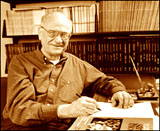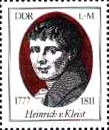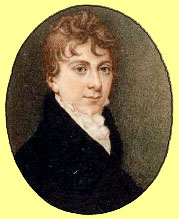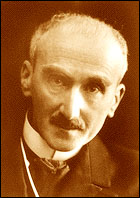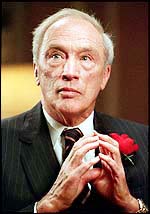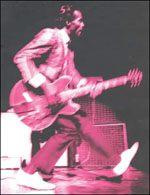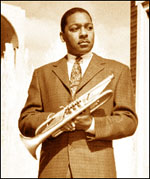 |
News On This Day |
| Friday, October 18, 2002 | Happy 81st Birthday to Harold A. Scheraga |
In Appreciation, by Peter Y. Chou |
|
Stockholm, October 18, 1962—
Nobel Prize in Medicine Awarded to J. D. Watson, Francis Crick, & Maurice Wilkins for their Discovery of the Double Helix Structure of DNA
DNA is a high polymer composed of a few types of building blocks, which occur in large numbers.
These building blocks are a sugar, a phosphate, and nitrogen-containing chemical bases.
The same sugar and the same phosphate are repeated throughout the giant molecule,
but with minor exceptions there are four types of nitrogenous bases. It is for the discovery
of how these building blocks are coupled together in three dimensions that this year's
Nobel Prize in Physiology or Medicine has been awarded to James Dewey Watson,
Maurice Hugh Frederick Wilkins, and Francis Harry Compton Crick.
Wilkins investigated DNA of various biological origins by X-ray crystallographic techniques.
Such techniques are the most powerful tools which can be used to investigate the molecular
structure of matter. Wilkins' X-ray crystallographic recordings indicated that the very long
molecular chains of DNA were arranged in the form of a double helix.
Watson and Crick showed that the organic bases were paired in a specific manner in the two
intertwined helices and showed the importance of this arrangement.
Sitka, Alaska: October 18, 1867— United States Takes Formal
Possession of Alaska from Russia
London: October 18, 1871— Charles Babbage, Father of the Computer, Dies Near Age 80
October 18, 1922— British Broadcasting Company (BBC) Established
Short BBC Bio,
Longer BBC Bio,
The Formation of the BBC,
British Broadcasting History,
West Orange, NJ, October 18, 1931— Thomas Edison Dies at Age 84
Stockholm: October 18, 1967— Hans Bethe Awarded Nobel Prize in Physics
Stockholm: October 18, 1973— Wassily Leontief Awarded Nobel Prize in Economics
New York: October 18, 1977— Reggie Jackson Hits 3 Consecutive Homers
Baseball Hall of Fame: Reggie Jackson,
HOF Plaque
I left Cento early this morning and arrived here soon after. As soon as he heard that I had no intention
of staying long, an alert, well-informed guide raced me through the streets and so many churches and
palaces that I scarcely had time to mark down the places I visited... But now for a few highlights.
First of all, the Cecilia by Raphael. My eyes confirmed what I have always known: this man
accomplished what others could only dream of. Ehat can one really say about this picture except that
Raphael painted it! Five saints in a row— their names don't matter— so perfectly realized
that one would be content to die so long as this picture could endure forever. But in order to understand
and appreciate Raphael properly, one must not merely glorify him as a god who appeared suddenly on earth
without a father or a mother, like Melchizedek; one must consider his ancestors, his masters. These were
rooted in the firm ground of truth; it was their labour and scrupulous care which laid the broad foundation;
it was they who vied with each other in raising, step by step, the pyramid, on the summit of which the
divine genius of Raphael was to place the last stone and reach a height which no one else will surpass or equal.
— Johann Wolfgang von Goethe (1749-1832),
Italian Journey,
I have spent the day well just looking and looking. It is the same in art as in life. The deeper one penetrates,
the broader grows the view. In the sky of art, countless new stars keep appearing, the Carracci, Guido,
Domenichino, and they puzzle me. To enjoy these children of a later, happier period properly would require
a knowledge and a competence of judgment which I lack and which can only be acquired gradually... I have
visited the famous scientific academy called The Institute or The Studies. This large building, especially
its inner courtyard, looks austere enough, although the architecture is not the best... An earlier observation
came back to my mind: though Time changes everything, men cling to the form of a thing as they first knew it,
even when its nature and function have changed. The Christian Churches still cling to the basilca form, though
that of a temple would be better suited, perhaps, to their ritual. Scientific institutions still look like
monasteries because it was in such pious precincts that study found its first quiet refuge.
— Johann Wolfgang von Goethe, Italian Journey, Bologna, October 19, 1786
Today, I [Eckermann] dined for the first time with Goethe. No one was present except Frau von Goethe,
Fräulein Ulrica, and little Walter, and thus we were all very comfortable. Goethe appeared now solely
as father of a family, helping to all the dishes, carving the roast fowls with great dexterity, and not
forgetting between the whiles to fill the glasses. We had much lively chat about the theater, young English
people, and other topics of the day; Fräulein Ulrica was especially lively and entertaining. Goethe was
generally silent, coming out only now and then with some pertinent remark. From time to time he glanced at
the newspaper, now and then reading us some passages, especially about the progress of the Greeks.
They then talked about the necessity of my learning English, and Goethe earnestly advised me to do so,
particularly on account of Lord Byron; saying that a character of such eminence had never existed before...
After dinner Goethe showed me some experiments relating to his theory of colors. The subject was, however,
new to me; I neither understood the phenomena, nor what he said about them. Nevertheless, I hoped that the
future would afford me leisure and opportunity to initiate myself a little into this science.
— Johann Wolfgang von Goethe (1749-1832), Conversations with Eckermann,
Goethe has, for some time past, been reading the "Globe" very eagerly, and he often makes this paper
the subject of his conversation. The endeavors of [Victor] Cousin and his school appear to him especially
important. "These men," he said, "are quite on the way to effect an approximation between France and
Germany, inasmuch as they form a language which is entirely fitted to facilitate the interchange of ideas
between the two nations." The "Globe" has also a particular interest for Goethe, because the newest
productions in French belles-lettres are reviewed, and the freedom of the romantic school, or
rather the emancipation from the fetters of unmeaning rules, is often defended in a very animated manner.
"What is the use of the whole lumber of rules belonging to a stiff antiquated time," Goethe said today,
"and what is the use of all the noise about classical and romantic! The point is for a work to be
thoroughly good and then it is sure to be classical."
— Johann Wolfgang von Goethe, Conversations with Eckermann, Friday, October 17, 1828
All true greatness must come from internal growth. If it be agreed that I am always to express my thought,
what forbids me to tell the company that a flea bites me or that my occasions call me behind the house?
— Ralph Waldo Emerson (1803-1882),
Journals, October 17, 1832
When I see a man of genius he always inspires me with a feeling of boundless confidence in my own powers.
Yesternight I talked to Mr Alcott of education. He proposes still the old recipe the illustration of humanity
in the life of Jesus. I say, No, let us postpone everything historical to the dignity & grandeur of the present
hour... Say the thing that is fit for this new-born and infinite hour. Come forsake, this once, this balmy time,
the historical, & let us go to the Most High & go forth with him now that he is to say, Let there be Light.
Propose no methods, prepare no words, select no traditions, but fix your eye on the audience, & the fit word
will utter itself as when the eye seeks the person in the remote corner of the house the voice accomodates
itself to the area to be filled.
— Ralph Waldo Emerson, Journals, October 18, 1836
I went thro' the wood to Sleepy Hollow & sat down to hear the harmless roarings of the sunny Southwind.
Into the narrow throat of the vale flew dust & leaves from the fields, & straggling leaves mounted &
mounted to great heights. The shining boughs of the trees in the sun, the swift sailing clouds, & the
warm air made me think a man is a fool to be mean & unhappy when every day is made illustrious by these
splendid shows.
— Ralph Waldo Emerson, Journals, October 18, 1837
As long as the world soul seeks an external God, it never can have peace, it always must be uncertain
what may be done & what may become of it. But when it sees the Great God far within its own nature,
then it sees that always itself is a party to all that can be, that always it will be informed of that
which will happen and therefore it is pervaded with a great Peace.
The individual is always dying. The Universal is life. As much truth & goodness as entersinto me so much
I live. As much error & sin so much death is in me. Yet Reason never informs us how the world was made.
I suppose my friends have some relation to my mind. Perhaps they are its thoughts, taking form & outness
though in a region above my will... 'Tis very strange how much we owe the perception of the absolute
solitude of the Spirit to the affections. I sit alone & cannot arouse myself to thought, I go & sit with
my friend & in the endeavor to explain my thought to him or her, I lay bare the awful mystery to myself
as never before & start at the total loneliness & infinity of one man.
— Ralph Waldo Emerson, Journals, October 19, 1837
In these golden days it behooves me once more to make my annual inventory of the world. for the five last
years I have read each winter a new course of lectures in Boston, and each was my creed & confession of faith.
Each told all I thought of the past, the present, & the future... What shall be the substance of my shrift?...
I am to fire with what skill I can the artillery of sympathy & emotion. I am to indicate constantly, though
all unworthy, the Ideal and Holy Life, the life within life— the Forgotten Good, the Unknown Cause in
which we sprawl & sin. I am to try the magic of sincerity, that luxury permitted only to kings & poets.
I am to celebrate the spiritual powers in their infinite contrast to the mechanical powers & the mechanical
philosophy of this time. I am to console the brave sufferers under evils whose end they cannot see by appeals
to the great optimism self-affirmed in all bosoms
— Ralph Waldo Emerson, Journals, October 18, 1839
I would have my book read as I have read my favorite books not with explosion & astonishment, a marvel
and a rocket, but a friendly & agreeable influence stealing like the scent of a flower or the sight of
a new landscape on a traveller. I neither wish to be hated & defied by such as I startle, nor to be kissed
and hugged by the young whose thoughts I stimulate... Plutarch's heroes are my friends & relatives.
— Ralph Waldo Emerson, Journals, October 1841
Look sharply after your thoughts. They come unlooked for, like a new bird seen on your trees,
and, if you turn to your usual task, disappear; and you shall never find that perception again;
never, I say— but perhaps years, ages, and I know not what events and worlds may lie
between you and its return!
— Ralph Waldo Emerson, Journals, October 1872
The autumnal tints, though less brilliant and striking, are perhaps quite as agreeable,
now that the frosts have somewhat dulled and softened them. Now that the forest is universally
imbrowned, they make a more harmonious impression. Wooded hillsides reflected in the water
are particularly agreeable. The undulation which the boat creates gives them the appearance
of being terraced. Chickadees and jays are heard from the shore as in winter. Saw two or three
ducks, which fly up, before and alight far behind.
— Henry David Thoreau (1817-1862),
Journal, October 18, 1852
With Sophia boated to Fair Haven, where she made a sketch. The red maples have been bare
a good while. In the sun and this clear air, their bare ashy branches even sparkle like silver.
The woods are losing their bright colors... The river is quite low now, lower than for many
weeks, and accordingly the white lily pads have their stems too long, and they rise above the
water four or five inches and are looped over and downward tothe sunken pad with its face down.
They make a singular appearance. Returning late, we see a double shadow of ourselves and boat,
one, the true, quite black, the other directly above it and very faint, on the willows and high bank.
— Henry David Thoreau,
Journal, October 18, 1853
How much beauty in decay! I pick up a white oak leaf, dry and stiff, but yet mingled red and green,
October-like, whose pulpy part some insect has eaten beneath, exposing the delicate network of its veins.
It is very beautiful held up to the light,— such work as only an insect eye could perform...
To rebuild the tortoise-shell is a far finer game than any geographical or other puzzle, for the
pieces do not merely make part of a plane surface, but you have got to build a roof and a floor
and the connecting walls. These are not only thus dovetailed and braced and knitted and bound
together, but also held together by the skin and muscles within. It is a band-box.
— Henry David Thoreau,
Journal, October 18, 1855
Rain all night and half this day... The sugar maples are now in their glory, all aglow with yellow,
red, and green. They are remarkable for the contrast they afford of deep blushing red on one half
and green on the other... I feel that my life is very homely, my pleasures very cheap. Joy and sorrow,
success and failure, grandeur and meanness, and indeed most words in the English language do not mean
for me what they do for my neighbors. I see that my neighbors look with compassion on me, that they
think it is a mean and unfortunate destiny which makes me to walk in these fields and woods so much
and sail on this river alone. But so long as I find here the only real elysium, I cannot hesitate in
my choice. My work is writing, and I do not hesitate, though I know that no subject is too trivial for
me, tried by ordinary standards; for, ye fools, the theme is nothing the life is everything. All that
interests the reader is the depth and intensity of the life excited. We touch our subject but by a point
which has no breadth, but the pyramid of our experience, or our interest init, rests on us by a broader
or narrower base. That is, man is all in all, Nature nothing, but as she draws him out and reflects him.
Give me simple, cheap, and homely themes.
— Henry David Thoreau,
Journal, October 18, 1856
So many leaves have now fallen in the woods that a squirrel cannot run after a nut without being heard...
the sounds of human industry and activity— the roar of cannon, blasting of rocks, whistling of
locomotives, rattling of carts, tinkering of artisans, and voices of men— may sound to some distant
ear like an earth-song and the creaking of crickets. The crickets keep about the mouths of their burrows
as if apprehending the cold. The finged gentian closes every night and opens every morning in my pitcher.
— Henry David Thoreau,
Journal, October 18, 1857
The large sugar maples on the Common are now at the height of their beauty... All children alike
can revel in this golden harvest. These trees, throughout the street, are at least equal to an
annual festival and holiday, or a week of such,— not requiring any special police to keep the
peace,— and poor indeed must be that New England village's October which has not the maple
in its streets. This October festival costs no powder nor ringing of bells, but every tree is a
liberty-pole on which a thousand bright flags are run up. Hundreds of children's eyes are steadily
drinking in this color, and by these teachers even the truants are caught and educated the moment
they step abroad... Let us have willows for spring, elms for summer, maples and walnuts and tupelos
for autumn, evergreens for winter, and oaks for all seasons... An avenue of elms as large as our
largest, and three miles long, would seem to lead to some admirable place, though only Concord
were at the end of it.
— Henry David Thoreau, Journal, October 18, 1858
We find ourselves in a world that is already planted, but is also still being planted as at first.
We say of some plants that they grow in wet places as at first. We say of some plants that they
grow in wet places and of others that they grow in desert places. The truth is that their seeds
are scattered almost everywhere, but here only do they succeed. Unless you can show me the pool
where the lily was created, I shall believe that the oldest fossil lilies which the geologist has
detected (if this is found fossil) originated in that locality in a similar manner to these of
Beck Stow's. We see thus how the fossil lilies which the geologist has detected are dispersed,
as well as these which we carry in our hands to church. The development theory implies a greater
vital force in nature, because it is more flexible and accommodating, and equivalent to a sort
of constant new creation.
— Henry David Thoreau, Journal, October 18, 1860
Delightful weather in the morning, before lunch. Drew the clumps of trees in the garden;
— Eugene Delacroix (1798-1863),
Journal, Thursday, October 18, 1849
All these last days I have been working with an extreme tenacity, before sending off my paintings which
are to be glued to the wall tomorrow [at the Hôtel de Ville]; I have gone without resting for seven,
eitht, and nearly nine hours' work on my pictures. I believe that my system of just one meal a day is
decidely the one that suits me the best.
— Eugene Delacroix, Journal, Monday, October 18, 1852
Still on the question of the use of the model and on imitation. Jean-Jaques [Rousseau] says rightly that
the best way to paint the charms of liberty is to be in prison, that the best way to describe a pleasant
bit of country is to live in a wearisome city and to see the sky only from an attic window and amongst
the chimneys. With my nose to the landscape, surrounded by trees and charming spots, my landscape painting
is heavy, too much worked out, more truthful in detail perhaps, but lacking harmony with the subject...
I didn't begin to do anything passable in my trip to Africa until the moment when I had sufficiently
forgotten small details, and so remembered the striking and poetic side of things for my pictures; up to
that point, I was pursued by the love of exactitude, which the majority of people mistake for truth.
— Eugene Delacroix, Journal, Monday, October 17, 1853
Every evening while those gentlemen are having their interminable game of billiards, I take a walk in front
of the château. At the beginning of the week I had a delightful moonlight. We had an almost total eclipse,
which gave to the moon that color of blood of which one reads in the poets and which Berryer told me he did not
know. It is somewhat the same thing in this question of Pariset and Hippocrates. The great men see what the
vulgar do not see: that is what makes them great men. What they have discovered and many times cried from the
roofs is neglected or uncomprehended by those to whom they speak. Time, but more often another man of their
own temper, finds the phenomena once more and at last demonstrates it to the crowd.
I wish I could recall whether Vergil, in the description of his tempest, makes the sky turn around the heads
of his sailors, as I saw it when I was on my way to Tangier, during that windstorm in the night when the sky
was without clouds and when it seemed, because of the movements of the ship, that the moon and the stars were
in a continuous and immense movement.
— Eugene Delacroix, Journal, October 19, 1856
Be kind enogh to accept this volume from me (a signed copy of Evangeline), in memory of pleasant hours
passed in Rome, and of your kindness to me there. To me those are memorable days. Your portrait with the
light hangs in my Library. It always gives me pleasure to look upon it; and not less to all who see it.
— Henry Wadsworth Longfellow (1807-1882),
Letter to Franz Liszt, October 18, 1872
Dear Stannie: I wrote today to E.M. [Elkin Mathews] saying Symons had sent me the letter and adding that I was
re-arranging the verses but would send the MS in a few days. I do not understand your arrangement: write it out
clearly again. Why do you allude to hexameter in 'Sleep Now'? U — U (U) is the foot used. Do you mean 'All day'
and 'I hear' to precede 'Sleep now'? That arrangement would be rather jolty, I think. Or do you mean me to end on
'I hear?' I understand hat arrangement better: namely: 'Sleep now' 'All day' and 'I hear'. Also do you mean me to
include the Cabra poem? Can I use it here or must I publish it in a book by itself as, of course, my dancing days are over.
— James Joyce (1879-1940),
Letter to Stanislaus Joyce, October 18, 1906
Dear Larbaud: Of course you are to have the casting vote in all discussions [French translation of Ulysses].
I agree with every word of your letter to Miss Monnier. The German translation [Ulysses] came out on Tuesday
last. I could not write a line on Svevo— or anything else. I have just finished revision of Anna Livia for
transition no 8. What a job! 1200 hours of work on 17 pages. She has grown— riverwise— since the night
you heard her under the sign of Ursa Minor. Her fluvial maids of honour from all ends of the earth now number
about 350 I think [number of river names Joyce incorporated in the Anna Livia Plurabelle chapter of Finnegans Wake].
— James Joyce (1879-1940),
Letter to Valery Larbaud, October 18, 1927
Mexico has a certain mystery of beauty for me, as if the gods were here. Now, in this October, the days
are so pure and lovely, like an enchantment, as if some dark-face gods were still young. I wish it could
be that I could start a little centre— a ranch— where we could have our little adobe
houses and make a life... It is always what I work for. But it must come from the inside, not from the will.
And when it will be it will be, I suppose... But let us watch; things, when they come, come suddenly.
— D. H. Lawrence (1885-1930), Letter to Catherine Carswell,
October 17, 1923
A new way of approaching the subject of Nirvana has come to my mind which may be helpful in clarifying certain difficulties
relative to the nature of this State... Approached from the usual standpoint of relative consciousness, the 'I' seems to be
something like a point. This 'point' is one man is different from the 'I' in another man. One 'I' can have interests that
are incompatible the interests of another 'I,' and the result is conflict. Further, the purpose of life seems to center
around the attainment of enjoyment by the particular I-point which a given individual seems to be. It is true that in
one sense the 'I' is a point, and the first objective of the discriminative practice is the isolation of this point
from all the material filling of relative consciousness, and then restricting self-identity to this point... I found
that the 'I' had come to mean Space instead of a point. It was a Space that extended everywhere that my consciousness
might happen to move. I found nowhere anything beyond Me, save that at the hightest stage both 'I' and Divinity blended
in Being. But all of this process involved both an intensifying and broadening of Consciousness, and most emphatically not
a narrowing or 'pinching out' of it... Further, the Space-I is a State of infinite completeness, as compared with the
consciousness of any point-I or the compound effect of any number of point-I's. Of course, such a State is one of Bliss
immeasurably transcending anything possible for any point-I. It is the Space-I Consciousness which is Nirvana.
Franklin Merrell-Wolff (1887-1985),
Pathways through to Space (October 17, 1936)
In September, the carob trees breathe a scent of love over all Algiers, and it is as if the whole earth were resting
after having given itself to the sun, its belly still moist with almond-flavored seed. On the road to Sidi-Brahim, after
the rain, the scent of love falls from the carob trees, heavy and oppressive, weighed down with al its load of water.
Then, as the sun sucks up the water and the colors recover their brightness, the scent of love lessens and becomes
hardly noticeable. And it is like a mistress who comes out with you into the street after a whole stifling afternoon,
and who, as she leans her shoulder against yours, looks at you in the midst of all the street lights and crowd.
— Albert Camus (1913-1960), Notebooks 1935-1942, October 18, 1937
A visitor asked: "What is the reality of this world?"
— Ramana Maharshi (1879-1950),
Day By Day with Bhagavan
The mind is a bundle of thoughts. But the source of all thoughts is the I-thought. So if you try to find
out who this "I" is, the mind will disappear. The mind will exist only so long as you think of external
things. But when you draw it from external things and make it think of the mind or "I"— in other
words introvert it— it ceases to exist.
— Ramana Maharshi (1879-1950), Day By Day with Bhagavan
In the middle of the night, when it was quiet after thunder and lightning, the brain was utterly still
and meditation was an opening into immeasurable emptiness. The very sensitivity of the brain made it still;
it was still for no cause; the action of stillness with cause is disintegration. It was so still that the
limited space of a room had disappeared and time had stopped. There was only an awakened attention, with
a centre which was attentive; it was the attention in which the origin of thought had ceased, without any
violence, naturally, easily. It could hear the rain and movement in the next room; it was listening without
any interpretation and watching without knowledge. The body was also motionless. Meditation yielded to the
otherness; it was of shattering purity. Its purity left no residue; it was there, that is all and nothing
existed. As there was nothing, it was. It was the purity of all essence. This peace is a vast, boundless
space, of immeasurable emptiness.
— Jiddu Krishnamurti (1895-1986),
Krishnamurti's Notebook,
October 18, 1961 |
Born on October 18:
Harold A. Scheraga
Canaletto
(1697-1768)
Heinrich von Kleist
Thomas Love Peacock
Henri Bergson (1859-1941)
Miriam Hopkins
(1902-1972)
Pierre Elliot Trudeau
Little Orphan Annie
Melina Mercouri
Chuck Berry
George C. Scott
(1927-1999)
Mike Ditka
Martina Navratilova
Wynton Marsalis
|
 The discovery of the three-dimensional molecular structure of the deoxyribonucleic acid— DNA,
is of great importance because it outlines the possibilities for an understanding in its finest
details of the molecular configuration, which dictates the general and individual properties of
living matter. DNA is the substance which is the carrier of heredity in higher organisms.
The discovery of the three-dimensional molecular structure of the deoxyribonucleic acid— DNA,
is of great importance because it outlines the possibilities for an understanding in its finest
details of the molecular configuration, which dictates the general and individual properties of
living matter. DNA is the substance which is the carrier of heredity in higher organisms.
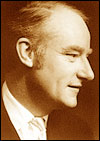


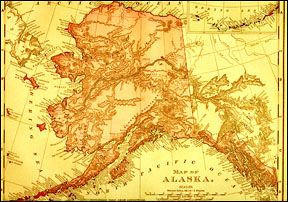 The Crimean war had disastrous effects on the Russian economy and domestic affairs.
In 1859, the Russians tried to interest the United States in purchasing Alaska.
Due to the Civil War, the purchase was not completed until March 30, 1867 when
the Treaty of Purchase was signed in Washington D.C. It was affirmed by the Senate
on April 9th, and signed by President Andrew Johnson on May 28th. Formal transfer
of the territory was made at Sitka on October 18, 1867. The purchase price was
$7,200,000. Shortly afterwards, Alaska was nicknamed Seward's Folly and Seward's Icebox.
The Crimean war had disastrous effects on the Russian economy and domestic affairs.
In 1859, the Russians tried to interest the United States in purchasing Alaska.
Due to the Civil War, the purchase was not completed until March 30, 1867 when
the Treaty of Purchase was signed in Washington D.C. It was affirmed by the Senate
on April 9th, and signed by President Andrew Johnson on May 28th. Formal transfer
of the territory was made at Sitka on October 18, 1867. The purchase price was
$7,200,000. Shortly afterwards, Alaska was nicknamed Seward's Folly and Seward's Icebox.
 Charles Babbage was born on December 26, 1791 in Devonshire, England.
He graduated from Trinity College, Cambridge in 1814, and received MA in 1817.
Babbage started work on his Difference Engine through funding from the British Government in 1823.
He published a table of logarithms from 1 to 108000 in 1827. He was appointed to the Lucasian Chair
of Mathematics at Cambridge in 1828, but never presented a lecture. In 1831, Babbage founded the
British Association for the Advancement of Science. He published "Economy of Manufactures and Machinery"
in 1832. Babbage began work on the Analytical Engine in 1833, and founded the Statistical Society of London
in 1834. Some of Babbage's other inventions include the cowcatcher, dynamometer, standard railroad gauge,
uniform postal rates, occulting lights for lighthouses, Greenwich time signals, and the heliograph opthalmoscope.
Babbage had a fascination for fire. He once was baked in an oven at 265oF for "five or six minutes
without any great discomfort." On another occasion he was lowered into Mt. Vesuvius to view molten lava.
Babbage would stop to measure the heartbeat of a pig (to be listed in his "Table of Constants of the Class
Mammalia"), or to affix a numerical value to the breath of a calf. In 1856 he proposed to the Smithsonian
that an effort be made to produce "Tables of Constants of Nature and Art", which would
"contain all those facts which can be expressed by numbers in the various
sciences and arts". Babbage published Passages from the Life of a Philosopher in 1864.
and argued that miracles were not, as Hume write, violations of laws of nature, but could exist
in a mechanistic world. If he could program long series on his calculating machines, God could
program similar irregularities in nature. He wrote that miracles are not "the breach of established laws, but indicate the existence of far higher laws".
Charles Babbage was born on December 26, 1791 in Devonshire, England.
He graduated from Trinity College, Cambridge in 1814, and received MA in 1817.
Babbage started work on his Difference Engine through funding from the British Government in 1823.
He published a table of logarithms from 1 to 108000 in 1827. He was appointed to the Lucasian Chair
of Mathematics at Cambridge in 1828, but never presented a lecture. In 1831, Babbage founded the
British Association for the Advancement of Science. He published "Economy of Manufactures and Machinery"
in 1832. Babbage began work on the Analytical Engine in 1833, and founded the Statistical Society of London
in 1834. Some of Babbage's other inventions include the cowcatcher, dynamometer, standard railroad gauge,
uniform postal rates, occulting lights for lighthouses, Greenwich time signals, and the heliograph opthalmoscope.
Babbage had a fascination for fire. He once was baked in an oven at 265oF for "five or six minutes
without any great discomfort." On another occasion he was lowered into Mt. Vesuvius to view molten lava.
Babbage would stop to measure the heartbeat of a pig (to be listed in his "Table of Constants of the Class
Mammalia"), or to affix a numerical value to the breath of a calf. In 1856 he proposed to the Smithsonian
that an effort be made to produce "Tables of Constants of Nature and Art", which would
"contain all those facts which can be expressed by numbers in the various
sciences and arts". Babbage published Passages from the Life of a Philosopher in 1864.
and argued that miracles were not, as Hume write, violations of laws of nature, but could exist
in a mechanistic world. If he could program long series on his calculating machines, God could
program similar irregularities in nature. He wrote that miracles are not "the breach of established laws, but indicate the existence of far higher laws".

 The aim of the BBC was to establish
a national network with transmitters in all major cities, financed first in part,
later entirely, by licences to operate 'wireless' receiving equipment. The first
transmissions on Station 2LO took place on 22 May 1922 at Marconi House in Aldwych,
London. On October 18, 1922, the British Broadcasting Company took over 2LO.
There were then 50,000 listeners. Soon after, headquarters moved to Savoy Hill,
and the company developed separate transmissions from Manchester and Birmingham.
In 1927, a royal charter changed this company into the British Broadcasting Corporation
(motto: 'Nation shall speak peace unto nation'), which moved in 1932 into Broadcasting House,
Portland Place, London. It was enjoined by the charter to 'inform, educate and entertain'
its listeners.
The aim of the BBC was to establish
a national network with transmitters in all major cities, financed first in part,
later entirely, by licences to operate 'wireless' receiving equipment. The first
transmissions on Station 2LO took place on 22 May 1922 at Marconi House in Aldwych,
London. On October 18, 1922, the British Broadcasting Company took over 2LO.
There were then 50,000 listeners. Soon after, headquarters moved to Savoy Hill,
and the company developed separate transmissions from Manchester and Birmingham.
In 1927, a royal charter changed this company into the British Broadcasting Corporation
(motto: 'Nation shall speak peace unto nation'), which moved in 1932 into Broadcasting House,
Portland Place, London. It was enjoined by the charter to 'inform, educate and entertain'
its listeners.
 Thomas Alva Edison was born on February 11, 1847 in the town of Milan, Ohio.
He was an active, curious child. His formal education ended at the age of 7,
after only three months at school. Thanks to his mother, a former teacher,
he learned to read and developed an interest in books on a variety of subjects.
He began his business and science career at the age of 12, and when he was 23,
he developed his first invention - an automatic telegraph system. In 1877,
Edison announced his invention of the phonograph by which sound could be recorded
and reproduced, and thus the era of sound recording began. At 31, he began working
on a safe, inexpensive electric light bulb, to replace the gas and kerosene lamps
which were in use at that time. In 1879, after a year of trials and experiments,
his "invention" lighted the dark skies of Menlo Park, New Jersey (the location
of his laboratory) for several hours. His invention was an incandescent light bulb
with a carbonized cotton thread for which he will always be remembered.
He also contributed to the development of the first large electric power station
which began operating in 1882, encouraging widespread use of electricity.
1093 patents are registered in Edison's name, including the alkaline battery,
a discovery known as the Edison Effect which led to the invention of the electronic
tube, the silent movie projector (predecessor of current cinema), and others.
Thomas Alva Edison, a great inventor, died on October 18, 1931 at the age of 84.
Thomas Alva Edison was born on February 11, 1847 in the town of Milan, Ohio.
He was an active, curious child. His formal education ended at the age of 7,
after only three months at school. Thanks to his mother, a former teacher,
he learned to read and developed an interest in books on a variety of subjects.
He began his business and science career at the age of 12, and when he was 23,
he developed his first invention - an automatic telegraph system. In 1877,
Edison announced his invention of the phonograph by which sound could be recorded
and reproduced, and thus the era of sound recording began. At 31, he began working
on a safe, inexpensive electric light bulb, to replace the gas and kerosene lamps
which were in use at that time. In 1879, after a year of trials and experiments,
his "invention" lighted the dark skies of Menlo Park, New Jersey (the location
of his laboratory) for several hours. His invention was an incandescent light bulb
with a carbonized cotton thread for which he will always be remembered.
He also contributed to the development of the first large electric power station
which began operating in 1882, encouraging widespread use of electricity.
1093 patents are registered in Edison's name, including the alkaline battery,
a discovery known as the Edison Effect which led to the invention of the electronic
tube, the silent movie projector (predecessor of current cinema), and others.
Thomas Alva Edison, a great inventor, died on October 18, 1931 at the age of 84.
 This year's Nobel Prize in Physics to Professor Hans A. Bethe— concerns an old riddle.
How has it been possible for the sun to emit light and heat without exhausting its source not only
during the thousands of centuries the human race has existed but also during the enormously long time
when living beings needing the sun for their nourishment have developed and flourished on our earth
thanks to this source? The solution of this problem seemed even more hopeless when better knowledge
of the age of the earth was gained. None of the energy sources known of old could come under consideration.
Some quite unknown process must be at work in the interior of the sun. Only when radioactivity, its energy
generation exceeding by far any known fuel, was discovered, it began to look as if the riddle might be solved.
And, although the first guess that the sun might contain a sufficient amount of radioactive substances soon
proved to be wrong, the closer study of radioactivity would by and by open up a new field of physical
research in which the solution was to be found. Even when Bethe started his work on the energy generation
in stars there were important gaps in the knowledge about nuclei which made the solution of the problem
very difficult. And it was by a remarkable combination of underdeveloped theory and incomplete experimental
evidence, under repeated comparison of his conclusions with their astronomical consequences, that he succeeded
in establishing the mechanism of energy generation in the sun and similar stars so well that only minor
corrections were needed when many years later the required experimental knowledge had made considerable
progress and when, moreover, electronic computers had become available for the numerical calculations.
This year's Nobel Prize in Physics to Professor Hans A. Bethe— concerns an old riddle.
How has it been possible for the sun to emit light and heat without exhausting its source not only
during the thousands of centuries the human race has existed but also during the enormously long time
when living beings needing the sun for their nourishment have developed and flourished on our earth
thanks to this source? The solution of this problem seemed even more hopeless when better knowledge
of the age of the earth was gained. None of the energy sources known of old could come under consideration.
Some quite unknown process must be at work in the interior of the sun. Only when radioactivity, its energy
generation exceeding by far any known fuel, was discovered, it began to look as if the riddle might be solved.
And, although the first guess that the sun might contain a sufficient amount of radioactive substances soon
proved to be wrong, the closer study of radioactivity would by and by open up a new field of physical
research in which the solution was to be found. Even when Bethe started his work on the energy generation
in stars there were important gaps in the knowledge about nuclei which made the solution of the problem
very difficult. And it was by a remarkable combination of underdeveloped theory and incomplete experimental
evidence, under repeated comparison of his conclusions with their astronomical consequences, that he succeeded
in establishing the mechanism of energy generation in the sun and similar stars so well that only minor
corrections were needed when many years later the required experimental knowledge had made considerable
progress and when, moreover, electronic computers had become available for the numerical calculations.
 The 1973 Nobel Prize in Economic Science has been awarded to Professor Wassily Leontief
for the development of the input-output method and for its application to important economic problems.
Professor Leontief is the sole and unchallenged creator of the input-output technique. This important
innovation has given to economic sciences an empirically-useful method to highlight the general
interdependence in the production system of a society. In particular, the method provides tools
for a systematic analysis of the complicated interindustry transactions in an economy.
Professor Leontief outlined the input-output technique as early as in the 1930s. A comprehensive
version of the analysis was published in 1941 in his book, The Structure of American Economy, 1919-1929.
The method has proved particularly effective
in the analysis of sudden and large changes, as in the case of military mobilization or other far-reaching
tranformations of an economy. The method has also been applied in studies of how cost and price changes
are transmitted through various sectors of an economy. Among recent developments of the method may be
mentioned its extension to include residuals of the production system— smoke, water pollution,
scrap, etc., and the further processing of these. In this way the effects of the production on the
environment can be studied.
The 1973 Nobel Prize in Economic Science has been awarded to Professor Wassily Leontief
for the development of the input-output method and for its application to important economic problems.
Professor Leontief is the sole and unchallenged creator of the input-output technique. This important
innovation has given to economic sciences an empirically-useful method to highlight the general
interdependence in the production system of a society. In particular, the method provides tools
for a systematic analysis of the complicated interindustry transactions in an economy.
Professor Leontief outlined the input-output technique as early as in the 1930s. A comprehensive
version of the analysis was published in 1941 in his book, The Structure of American Economy, 1919-1929.
The method has proved particularly effective
in the analysis of sudden and large changes, as in the case of military mobilization or other far-reaching
tranformations of an economy. The method has also been applied in studies of how cost and price changes
are transmitted through various sectors of an economy. Among recent developments of the method may be
mentioned its extension to include residuals of the production system— smoke, water pollution,
scrap, etc., and the further processing of these. In this way the effects of the production on the
environment can be studied.
 Reggie Jackson "Mr. October" hits a record of 5 homers in the 1977 World Series,
4 of them consecutive, including 3 in today's game on 3 first pitches off 3 different Dodgers
pitchers— Burt Hooton, Elias Sosa, and Charlie Hough. Reggie was awarded the World Series MVP
for his 9 hits, 10 runs, 5 homers, .450 batting average, and 1.25 slugging average in six games.
The Yankees wins their first World Series in 15 years (in 1962 they defeated the San Francisco Giants 4-3).
"I must admit," said Steve Garvey, the Dodgers' first baseman, "when Reggie Jackson hit his third home run
and I was sure nobody was listening, I applauded into my glove." Reggie was the 1973 World Series MVP
when his Oakland A's defeated the New York Mets 4-3.
Reggie Jackson "Mr. October" hits a record of 5 homers in the 1977 World Series,
4 of them consecutive, including 3 in today's game on 3 first pitches off 3 different Dodgers
pitchers— Burt Hooton, Elias Sosa, and Charlie Hough. Reggie was awarded the World Series MVP
for his 9 hits, 10 runs, 5 homers, .450 batting average, and 1.25 slugging average in six games.
The Yankees wins their first World Series in 15 years (in 1962 they defeated the San Francisco Giants 4-3).
"I must admit," said Steve Garvey, the Dodgers' first baseman, "when Reggie Jackson hit his third home run
and I was sure nobody was listening, I applauded into my glove." Reggie was the 1973 World Series MVP
when his Oakland A's defeated the New York Mets 4-3.
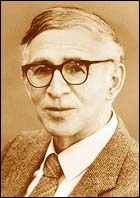 The Royal Swedish Academy of Sciences has decided to award the 1982 Nobel Prize for chemistry to
Aaron Klug, MRC Laboratory of Molecular Biology, Cambridge, England, for his development of crystallographic
electron microscopy and his structural elucidation of biologically important nucleic acid-protein complexes.
The method of Klug makes it possible to determine structures at high resolution of functionally important
molecular aggregates. Klug himself has chiefly investigated complexes between nucleic acids and proteins,
the key substances of life. One nucleic acid, DNA, is carrier of the traits of heredity in the chromosome
of the cell nucleus, and it forms giant complexes with specific proteins, histones. Less complicated nucleic
acid-protein complexes are found in viruses, which can be said to be genetic material without a cell of
its own. Klug has used the whole arsenal of structural chemistry, including his own method, to investigate
the structure of several viruses, e.g. tobacco mosaic virus (TMV). His structural investigations snow that
TMV contains a long thread of nucleic acid which is arranged in the form of a helix through interaction
with as many as 2130 identical protein molecules. Klug's structural investigations have also given a detailed
picture of the formation of the virus particle from a mixture of its nucleic acid and protein constituents.
In this way he has illuminated a very important biochemical principle, namely the spontaneous formation of
complicated functional molecular aggregates from the molecular components.
The Royal Swedish Academy of Sciences has decided to award the 1982 Nobel Prize for chemistry to
Aaron Klug, MRC Laboratory of Molecular Biology, Cambridge, England, for his development of crystallographic
electron microscopy and his structural elucidation of biologically important nucleic acid-protein complexes.
The method of Klug makes it possible to determine structures at high resolution of functionally important
molecular aggregates. Klug himself has chiefly investigated complexes between nucleic acids and proteins,
the key substances of life. One nucleic acid, DNA, is carrier of the traits of heredity in the chromosome
of the cell nucleus, and it forms giant complexes with specific proteins, histones. Less complicated nucleic
acid-protein complexes are found in viruses, which can be said to be genetic material without a cell of
its own. Klug has used the whole arsenal of structural chemistry, including his own method, to investigate
the structure of several viruses, e.g. tobacco mosaic virus (TMV). His structural investigations snow that
TMV contains a long thread of nucleic acid which is arranged in the form of a helix through interaction
with as many as 2130 identical protein molecules. Klug's structural investigations have also given a detailed
picture of the formation of the virus particle from a mixture of its nucleic acid and protein constituents.
In this way he has illuminated a very important biochemical principle, namely the spontaneous formation of
complicated functional molecular aggregates from the molecular components.
